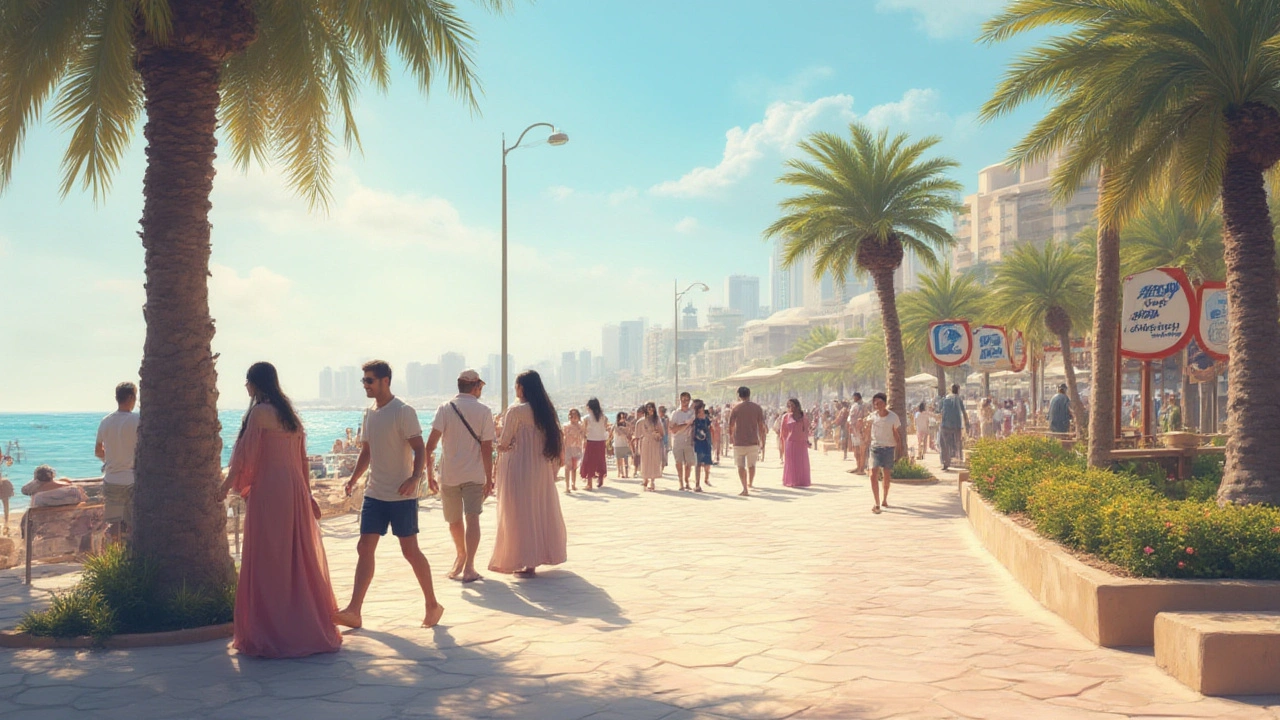What makes Dubai so fascinating isn’t just the city’s shiny skyscrapers, but the sharp contrast between the ultramodern and the traditional. You can shop at the world’s biggest mall, walk under indoor waterfalls, then turn a corner and find yourself in the old-world charm of bustling souks. But here’s what most visitors miss: Dubai has invisible lines you really don't want to cross. One careless act, and you might find yourself in real trouble—even for something pretty ordinary back home. Yes, the city loves glamour and newness, but its roots are deep in conservative Emirati culture. That means ‘anything goes’ just doesn’t fly here. You can have the time of your life, but only if you understand what counts as inappropriate.
Public Behavior: What’s Off-Limits on Dubai Streets
In Dubai, the rules for what’s “inappropriate” start right out in public. Sure, you’ll see expats and tourists pretty much everywhere, but don’t let that fool you—local laws apply to everyone. If you ever considered giving someone a kiss on the sidewalk, stop right there. Public displays of affection (PDA) are not just frowned upon—they can land you a fine or even jail time. Something as simple as holding hands is only tolerated for married couples, and even that is best kept subtle. I once saw a young couple being politely cautioned by mall security just for hugging. The line between being friendly and being “inappropriate” is razor-thin.
Swearing, raising your voice, or rude gestures (think: flipping the bird) are all considered criminal offenses. It sounds wild, but these things are taken seriously. According to UAE law, acts like 'insulting by gesture' can result in a fine up to AED 10,000 or even deportation. And don’t even think about drunken antics in public. Alcohol is only legal in licensed bars, clubs, or at home (if you have a permit). Getting drunk in public can put you in a holding cell for the night or worse.
When it comes to photography, don’t just snap pics of strangers, especially women or government buildings. People can (and do) call the police if they feel their privacy is violated. Get permission if you want that perfect shot. Here’s another one that catches people out: eating or drinking on public transport is a no-go. It might just get you a warning, but why risk it over a croissant on the metro?
Inappropriate behavior Dubai rules cover every angle. Even reclining with your feet pointing at someone in public is rude. Locals view feet as unclean, so keep those toes down and shoes on when indoors. Racing around on e-scooters, skateboarding through the city, or even crossing roads outside designated crossings can result in a fine. There’s respect in every tiny gesture here, and trust me, the city is always watching.
Let’s look at some numbers for clarity. In 2024 alone, over 3,000 fines were issued just for eating on the metro in Dubai. The city authorities are fast and fair, but they don’t compromise when their rules are broken.
| Behavior | Punishment |
|---|---|
| PDA (kissing/hugging) | Fine/Jail/Deportation |
| Swearing/Rude Gestures | Fine up to AED 10,000/Jail |
| Photography without consent | Fine/Jail |
| Drunk in public | Jail/Deportation |
| Eating/drinking on metro | Fine up to AED 100 |
So how do you blend in? Respect personal space, avoid expressive gestures, and always ask before photographing locals. If you’re unsure, stay on the safe side and keep things low-key.

Dress Code and Appearance: What to Wear (or Not) in Dubai
What’s acceptable clothing in Dubai is a minefield for newcomers. Here’s the deal: There’s no law enforcing uniforms or burkas, and you’ll see miniskirts at beach clubs or parties. But once you step outside those settings, the rules tighten up fast. Modesty isn’t just a word here—it’s a mandate. Shoulders, cleavage, and knees should stay covered in public places outside resorts, especially in shopping malls, public transport, mosques, and government buildings.
Women in tank tops and mini shorts might turn heads in the tourist areas, but that same outfit in a local mall or market will result in either a warning from security or a visit from the police in extreme cases. Even men aren’t off the hook—walking around shirtless is strictly for the beach or your hotel room. Forget about low-slung shorts or anything that bares your chest; security might actually stop you and ask you to cover up.
If you enter a mosque, the rules step up even further. Women must cover their hair, arms, and legs completely. Men need to wear long pants and sleeves. Most touristy mosques have robes to borrow, but you’ll want to dress right as a sign of respect. At Jumeirah Mosque, staff actually hand out pashminas and long dresses to tourists and explain why covering up matters. The logic? Modesty is a part of Islamic culture and law, and ignoring it is a big red flag.
The dress code isn’t just about clothing—it extends to tattoos, piercings, and makeup. Tattoos aren’t illegal, but offensive body art (think anything disrespectful to religion or containing nudity) must be covered up. Excessive piercings, especially for men, draw comments and sometimes stares. Want to wear bold makeup? That’s fine in a club, but on the street during daylight it can invite unwanted attention. Modesty is the safest bet.
If you’re planning your wardrobe, remember these essentials:
- Women: Bring loose trousers, maxi skirts, t-shirts, and pashminas or scarves for covering up quickly.
- Men: Lightweight trousers and shirts with sleeves will get you everywhere safely.
- Swimwear: Only wear swimsuits or bikinis at pools, beaches, and water parks—and cover up before heading to or from the water. No walking through the hotel lobby in swim shorts!
- Evening wear: Nightclubs are a little more relaxed, but always bring something to cover up on your way in and out.
Business dress is formal here, especially in meetings or government buildings. Suits are the norm, and for women, dresses that cover knees and arms are safest. When in doubt, just look at what locals are wearing and aim for something a little more modest. After all, Dubai’s air-conditioned malls mean you won’t overheat covered up—even in July’s burning heat.

Hidden Pitfalls: Online Offenses, Social Norms, and Critical Taboos
Think a little grumbling about Dubai on social media is harmless? Think again! The UAE Cybercrime Law is one of the toughest in the world. Posting anything perceived as slander, gossip, or negativity about Dubai, the government, the police—or even other residents—can trigger fines, jail, or deportation. In 2023, a British tourist was jailed for reportedly posting a negative review about her hotel on Facebook. One angry tweet can spiral into a nightmare. An Emirati influencer was fined the equivalent of $54,000 (AED 200,000) in 2024 for spreading “misleading content” about nightlife venues—so nobody’s untouchable.
WhatsApp and DMs might feel private, but aren’t protected. If someone complains about offensive content you sent—even in a group chat—the authorities have the right to investigate. Sending nude pictures, insults, or even memes considered to disrespect the government or religion can have real consequences. Basically, keep your phone conversations ‘squeaky clean’ while you’re in the UAE.
Religion is another red line you don’t want to cross. Public criticism of Islam, proselytizing, disrespecting mosque etiquette (like talking loudly or photographing without permission), or even eating in public during Ramadan daylight hours, are all punishable by law. Non-Muslims are expected to respect Ramadan fasting in public—even sipping water outdoors can result in a warning, fine, or arrest.
Another one that trips up visitors: relationships outside of marriage. Cohabiting, sharing a hotel room, or even holding hands with someone who’s not your legal spouse may have been decriminalized among expats as of late 2020, but strict interpretation still pops up—especially during energetic police checks and in more conservative neighborhoods. If you’re in a same-sex relationship, discretion is vital; LGBTQ+ rights are limited and public displays of affection between same-sex couples, especially in public, are risky.
Let’s not forget controlled substances. Drugs are absolutely zero-tolerance—Dubai authorities use ultra-sensitive scanners at airports. In 2024, a Scottish tourist was arrested because airport officials found 0.002g of cannabis in his luggage (yes, you read that right—basically the dust in a pocket). Even some prescription meds like codeine and tramadol are banned unless you have specific documents from your doctor and approval from the Ministry of Health. Always double-check your meds before flying.
Here’s a quick table of actions that could get you in trouble online or in private:
| Digital Action | Consequence |
|---|---|
| Posting negative Dubai reviews | Fine/Jail/Deportation |
| Sharing explicit content | Jail/Deportation |
| Offensive religious memes | Jail/Deportation |
| Online insults/threats | Fine/Jail |
| Drug-related messages | Jail/Deportation |
Some final, practical tips for anyone coming to Dubai? Download the official UAE guidelines for tourists, which get updated every year and make for quick reading. Don’t assume you’ll get off with a slap on the wrist—Dubai police are fast, and the local culture values respect, privacy, and modesty above all. You’ll notice, the more quietly you act and dress, the more doors open for you. The rules might seem strict, but they also keep the city safe, stunningly clean, and surprisingly harmonious.
Dubai Escort
Write a comment